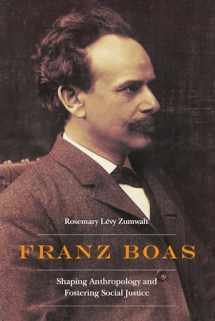
Franz Boas: Shaping Anthropology and Fostering Social Justice (Critical Studies in the History of Anthropology)
Book details
Summary
Description
Franz Boas defined the concept of cultural relativism and reoriented the humanities and social sciences away from race science toward an antiracist and anticolonialist understanding of human biology and culture. Franz Boas: Shaping Anthropology and Fostering Social Justice is the second volume in Rosemary Lévy Zumwalt’s two-part biography of the renowned anthropologist and public intellectual.
Zumwalt takes the reader through the most vital period in the development of Americanist anthropology and Boas’s rise to dominance in the subfields of cultural anthropology, physical anthropology, ethnography, and linguistics. Boas’s emergence as a prominent public intellectual, particularly his opposition to U.S. entry into World War I, reveals his struggle against the forces of nativism, racial hatred, ethnic chauvinism, scientific racism, and uncritical nationalism.
Boas was instrumental in the American cultural renaissance of the 1920s and 1930s, training students and influencing colleagues such as Melville Herskovits, Zora Neale Hurston, Benjamin Botkin, Alan Lomax, Langston Hughes, and others involved in combating racism and the flourishing Harlem Renaissance. He assisted German and European émigré intellectuals fleeing Nazi Germany to relocate in the United States and was instrumental in organizing the denunciation of Nazi racial science and American eugenics. At the end of his career Boas guided a network of former student anthropologists, who spread across the country to university departments, museums, and government agencies, imprinting his social science more broadly in the world of learned knowledge.
Franz Boas is a magisterial biography of Franz Boas and his influence in shaping not only anthropology but also the sciences, humanities, social science, visual and performing arts, and America’s public sphere during a period of great global upheaval and democratic and social struggle.


We would LOVE it if you could help us and other readers by reviewing the book
Book review



